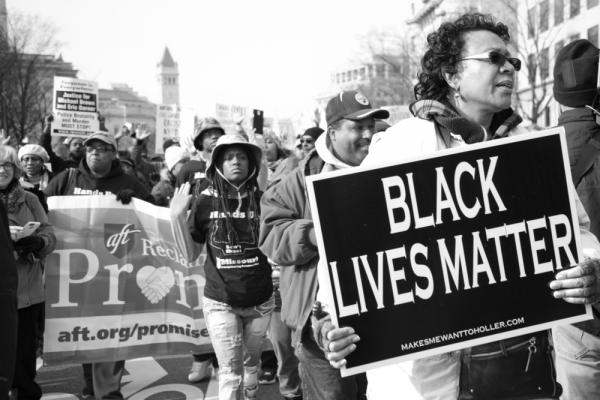The zeitgeist is clear. Much like Emmett Till’s murder in 1955 sparked the civil rights movement, the tragic string of murders of blacks in 2014 catalyzed another movement, the #BlackLivesMatter movement. This movement picks up where the civil rights movement left off, addressing systemic racial injustice in the legal and penal system, educational system, and economic system. In some ways, the battles we fight are more challenging than the ones our grandparents fought. Undeniably, we face off in a more complex world and against forms of systemic racism that are so subtle that they are almost invisible. Nevertheless, due to a unique combination of gifts and experiences, I’m hopeful that my generation of black millennials is ready to lead us on to a more equitable society. Here’s why.
1. We are propelled by the prophetic legacy of the past.
With a technological savvy that gives us unprecedented access to the true history of our people, and as perhaps the last generation to breathe the same air as the civil rights generation, we draw upon the legacies of the past as we move forward. When I sense that my capacity to forgive is waning, I recall my recent conversations with several survivors of the 16th Street Baptist Church bombing in Birmingham, Ala., and I’m reminded of the inner healing that forgiveness promises. When I am tempted to pander to the powers that be, I call my radical granddad and ask him to tell me again about the many Black Panthers meetings that took place at the church he pastored in Berkeley, Calif., in the 1960s. When I feel that I’m losing my courage, I read Ida B. Wells’ autobiography and am reminded that we are not alone. We are connected — part of a chain of black activists, each generation inspiring the next. Our heroes guide us every day.
2. We are cross-cultural.
We grew up in a multicultural world and are equipped to lead in a multicultural world. A sociology study that examined local diversity from 1980 (the year I was born) to 2010 (the year I turned 30), found that all spaces — urban, suburban and rural — showed significant increases in diversity over the 30-year time span. During our lifetime, it’s become increasingly difficult to find fully segregated spaces. As a result, many black millennials have interacted with a wide variety of cultural groups outside of the black community and have, by necessity, acquired cross-cultural communication and relational skills. Relatedly, as the black experience in America has become increasingly varied, we have become increasingly attuned to the non-racial cultural identities (e.g., gender, class, sexuality, religion) that intersect with race and affect our experiences and movement in society.
This cross-cultural aptitude enables us to engage the complexities of our time — a time in which rampant institutional racism is juxtaposed with the unprecedented success of individual black Americans. Many of us gasped when we watched the film Selma and were reminded that the 1960s images of police brutality toward black Americans are eerily similar to the 2014 images. Meanwhile, many of us are also glued to our television screens when Fox’s new hit show Empire, which portrays the making of a wealthy black dynasty, comes on. Both depictions resonate with us because both are accurate. We live in a complex world, one in which there are many different versions of the black experience. But our nuanced, multicultural understanding enables us to identify continuing systemic racism despite the individual success of black Americans. Further, it allows us to recognize and more effectively address the reality that all forms of injustice (racial, class, gender, etc.) are interconnected.
3. We still have our faith.
Much has been said about millennials leaving the church. But what typically goes unsaid is that only white millennials are leaving the church. Black millennials are still connected to faith communities — in both formal and informal ways. When I visit black churches all over the country, I see lots of ministry leaders and congregants that are my age. Indeed, a 2007 Pew Forum report found that black millennials make up 24 percent of historically black churches. Despite the ongoing frustrations of being black in America, black millennials haven’t given up on the faith that powered centuries of justice movements, including the abolitionist, anti-lynching, and civil rights movements. We haven’t given up on God and God hasn’t given up on us! Black millennials are engaging the God who understands our pain and demystifies our complex world. We are engaging the God whose death on the cross shouts #BlackLivesMatter and whose resurrection gives us hope for our future!
Christena Cleveland is a social psychologist and the author of Disunity in Christ: Uncovering the Hidden Forces that Keep Us Apart.
Image: Protesters march against police shootings and racism during a rally in Washington, D.C., on Dec. 13. Rena Schild / Shutterstock.com
Got something to say about what you're reading? We value your feedback!
